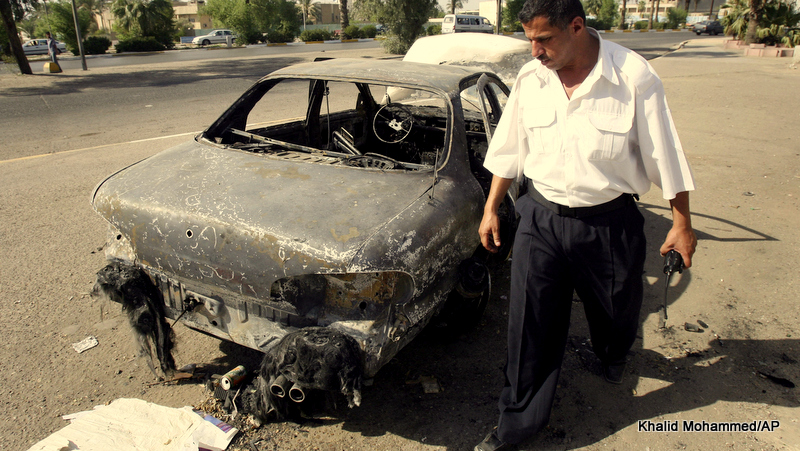
On Monday, attorneys for the four former Blackwater guards currently on trial for the 2007 killings of 14 Iraqi civilians, police officers and army personnel in Baghdad argued that the federal government knowingly suppressed evidence for the case. The evidence in question — photographs of eight spent shell casings fired at the scene of the shooting — could potentially lend support to the guards’ assertions that they were returning fire at the time.
U.S. Attorney Ronald Machen attributes the misplacement of the photographs to “a series of innocent oversights.”
The photographs were taken of a bus stop several hundred feet from Nisoor Square, where a Kia sedan — travelling on the wrong side of the road and ignoring police orders to yield to a Blackwater-guarded convoy — was fired on by Blackwater guards on Sept. 16, 2007. In the confusion, aggravated in part due to the fact that the security team dropped stun grenades to evacuate the scene, which were mistaken for fragmentation grenades, Blackwater and Iraqi police and military on the scene exchanged fire.
Blackwater asserts that the Kia was part of a car bombing attempt, the convoy was attacked from multiple directions, the police officers were shot because insurgents have been known to wear police uniforms, and the police officers’ attempt to roll the car toward the square suggested collusion.
This incident is not the first case of unjustified fire unleashed by Blackwater — which now operates under the name “Academi” — while in Iraq. On Feb. 16, 2005, four Blackwater guards fired 70 rounds into a car while escorting a U.S. State Department convoy. An investigation of the shooting found that Blackwater employees knowingly gave false statements about the shooting, including testimony that one of the Blackwater vehicles was fired upon by insurgents (a Blackwater employee actually fired upon the vehicle by mistake). Believing that punishment would deal a blow to Blackwater’s staff morale, no disciplinary action was taken by the embassy.
On Dec. 24, 2006, Andrew Moonen, a Blackwater employee at the time, was accused of shooting and killing a security guard of Adil Abdul Mahdi, then-vice president of Iraq, outside the prime minister’s compound. Believing that the man, Raheem Khalif, has a valid claim to self-defense, federal attorneys have declined to prosecute Moonen, with the State Department taking steps to protect his anonymity. In August 2007, Daniel Carroll, a manager for Blackwater, threatened to kill U.S. State Department Investigator Jean Richter during an investigation of Blackwater’s activities in Iraq. Carroll wrote in a memo to senior State Department officials that Richter said to him “that he could kill me at that very moment and no one could or would do anything about it as we were in Iraq.”
Blackwater — originally, a private training facility for the military and law enforcement — created a security company during the build-up to the Second Iraq War to provide private military support for high-risk details, such as protecting CIA facilities. The group’s “ready to roll” attitude and willingness to enter even the most inhospitable of situations — for example, offering security for North Korean asylum seekers in China — made it a favorite of the federal government, which could use the company to downplay federal involvement. However, the George W. Bush administration’s overdependence on Blackwater led to rapid growth and inconsistent oversight and leadership.
In some situations, State Department orders were changed without federal government consent — including strength and size of security details — and in others, drinking, partying and mistreatment of equipment and weaponry were rampant. In several cases, Blackwater was found to have overbilled the State Department and falsified staffing information.
In 2010, a WikiLeaks disclosure of Iraq War files found that Blackwater was responsible for 14 incidents other than the Nisoor Square situation in which Blackwater opened fire first, killing Iraqis. This was backed by the House Oversight and Government Reform Committee’s Democratic staff report, which found that Blackwater guards fired their weapons 1.4 times per week and that Blackwater forces reported firing first in over 80 percent of all cases.
Blackwater’s actions — along with the actions of other contractors — soured American-Iraqi relations and are thought to be among the major considerations leading to the American withdrawal from Iraq in 2011.
Despite this, the courts have upheld the notion that Blackwater was acting under U.S. government orders and is, therefore, immune from prosecution. However, without admitting guilt, the company agreed in 2012 to pay $7.5 million in fines to the federal government for arms smuggling and other crimes. The four defendants in the ongoing manslaughter trial — Donald Bell of West Valley City, Utah; Dustin Heard of Knoxville, Tennessee; Evan Liberty of Rochester, New Hampshire; and Paul Slough of Keller, Texas — are being tried despite a district judge ruling that the Justice Department mishandled evidence toward building a conviction and violated the constitutional rights of the accused, including using self-incriminating statements as evidence. A federal appeals court overruled the district judge’s objection in 2011.

